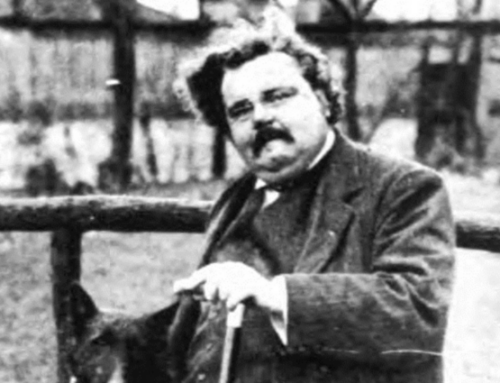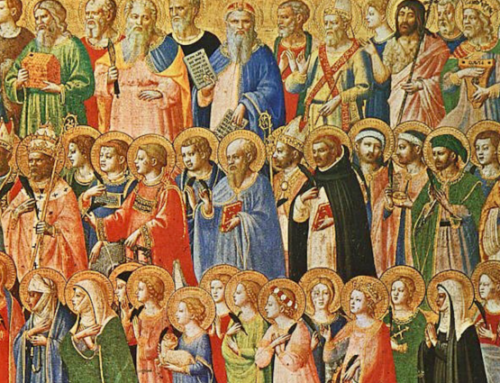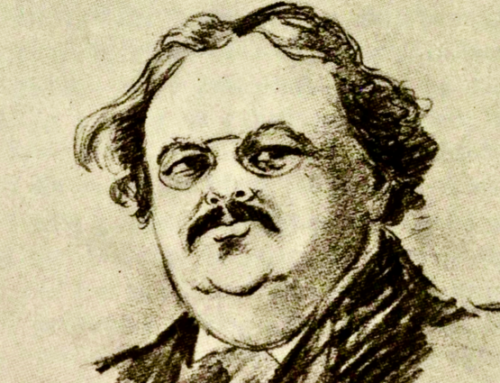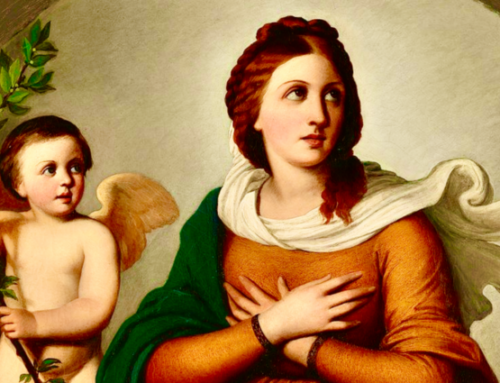Taken together, C.S. Lewis, J.R.R. Tolkien, and G.K. Chesterton might not be a holy trinity but they are certainly a holy triumvirate enabling us to see the world with rooted clarity and childlike wisdom.
One of the most interesting and spontaneously thought-provoking questions that I’ve ever been asked in an interview was asked by an undergraduate student at Montreat College in North Carolina. This young man, interviewing me before I gave a couple of talks at an Inklings conference at the college, asked me to describe Tolkien, Lewis and Chesterton using only one word for each. Taken off guard for a moment, I decided to treat the question like a game of word association, replying with the first word for each writer that came into my head. For Lewis, I said “clarity”; for Tolkien “rooted”; and for Chesterton “childlike.” Having done so, I’ve been pondering why I chose these three labels as the defining characteristic for each writer.
Beginning with C.S. Lewis, I’m sure that I chose “clarity” as his defining characteristic because of the uncanny way in which he can make the most abstract philosophical or theological question utterly comprehensible to the average reader, regardless of his reader’s lack of formal training in philosophy or theology. It’s not that he makes us smarter than we are, though he does, it’s that he makes us see that we were smarter than we thought we were. There is no reason, for example, for anyone, after reading Lewis, to feel that metaphysics is beyond his grasp. The easy didacticism with which he unlocks and unpacks the central doctrines of the Christian faith in his book Mere Christianity is a case in point. Lewis teaches us with such a natural and unassuming skill that we almost don’t realize that we are being taught at all. He makes the truth seem so obvious and so inescapable that we feel that we must already have known what he shows us, and that we must always have known it, at least subconsciously. We feel that Lewis is simply reminding us of what we already knew, even though, when we think about it honestly, we know that we had been too blind in the past to see the obvious truth which is now staring us in the face. The great fruit of Lewis’s clarity is, in sum, that he shows his readers that the great truths are knowable through the application of pure and simple common sense. The truths of faith and reason make sense because, well, they are eminently sensible!
I chose the word “rooted” to describe and define J.R.R. Tolkien because rootedness is the very essence of the man and its presence is the animating principle of all of his works. Tolkien is rooted etymologically, ecclesiologically and historically. He knows language as something rooted in the history of every word, so that every word has its own genealogy, its own family tree. He knows Christendom as something rooted in the living tradition and unbroken continuum of the Catholic Church, which he likened to a tree growing through the centuries from the sacred “mustard seed” planted by Christ. He knows history as the living story of man, as written by the Providential hand of God, a story which constitutes an unbroken continuum through time, characterized by the unchanging nature of man himself as a broken being living with the fragments that his brokenness leaves in its wake, living with what might be called the debris and detritus of his own sins and yet aspiring towards that something better which is his calling and his quest. “Actually I am a Christian, and indeed a Roman Catholic,” Tolkien wrote, “so that I don’t expect ‘history’ to be anything but a ‘long defeat’–though it contains…some samples or glimpses of final victory.” The “long defeat” is the permanent presence of the darkness of sin in the weaving of the human story that we call history; the samples and glimpses of final victory are the examples of holiness, of the self-sacrificial heroism which is the very “stuff” of sanctity, shining forth like candles of divine light in the sin-laden gloom until the Writer of the Story brings it to a “happily ever after” ending with His own Final Victory.
And this brings us to the “childlike” G.K. Chesterton. Why should I choose such an adjective as being the single most appropriate word to describe such a man? Why not “wisdom” or “innocence,” the two words I selected for the title of my biography of him? Why not “wonder”? Any of these would serve well, to be sure, but they are all incorporated in the single adjective I chose. Chesterton’s wisdom is childlike, as is his innocence and his sense of wonder. At the root of his being, Chesterton possessed a deep sense of gratitude about his own existence and the existence of everything else, a gratitude that is itself the fruit of the virtue of humility with which he was gifted to a profound degree, enabling him to see with eyes of wonder the glories of God’s Creation. With the eyes of a child he could see that even the most ordinary things were extraordinary, containing the divine spark, the divine presence, which is God’s Grandeur shining forth in His creatures. The child is, therefore, like God, in the sense that he can see all the things that God has made and see that they are good.
Pondering my act of spontaneity, labeling my heroes with the first word that entered my head, I am happy with the spur-of-the-moment choices I made. C.S. Lewis is indeed clarity personified; Tolkien is rooted in the very soil and soul of reality; and Chesterton is childlike in wisdom, innocence, and wonder. Taken together, Lewis, Tolkien, and Chesterton might not be a holy trinity but they are certainly a holy triumvirate enabling us to see the world with rooted clarity and childlike wisdom.
The Imaginative Conservative applies the principle of appreciation to the discussion of culture and politics—we approach dialogue with magnanimity rather than with mere civility. Will you help us remain a refreshing oasis in the increasingly contentious arena of modern discourse? Please consider donating now.
The featured image is courtesy of Pixabay.








The simplicity of Lewis added to the paradox of Chesterton allows arrival at the mystery of reality of Tolkein, all preparing the soul for its destiny of union with the divine embrace.
Excellent
I was referring to the article, not the post.